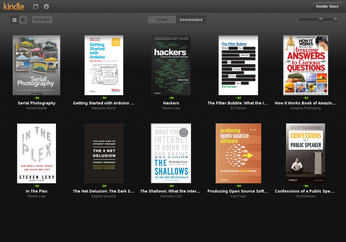Read Ebooks with Kindle Cloud Reader

Productivity Sauce
If you consider the lack of Amazon Kindle applications for the Linux desktop a nuisance, you will appreciate the recently launched Kindle Cloud Reader browser app that works with Google Chrome and Chromium on Linux. Although this app doesn't provide all the functionality of the Amazon Kindle desktop application, the Cloud Reader is a rather slick solution for reading books bought via Amazon Kindle without leaving the convenience of your browser. Installing the Kindle Cloud Reader is as easy as visiting https://read.amazon.com in the Chrome or Chromium browser. You will be prompted to install a browser app, and once you've done that you can access and read all your books purchased though the Amazon Kindle Store. The best part is that you can download and pin books, so you can read them offline.
Kindle Cloud Reader's interface is slick and user-friendly, so you shouldn't have problems finding your way around. A handful of buttons at the top can be used to navigate to specific parts of the currently viewed book, tweak viewing settings, and add bookmarks. While the reader app can also handle existing notes and highlights, it doesn't allow you to add new ones. This is the only serious drawback of the otherwise competent reader. Similar to other Kindle applications, the Kindle Cloud Reader syncs your current position in the book, so you can continue reading it on another platform. As you would expect, Kindle Cloud Reader integrates with the Amazon Kindle Store which is only a click away. And as soon as you buy a book, it immediately appears in your reader's library.
Comments
comments powered by DisqusSubscribe to our Linux Newsletters
Find Linux and Open Source Jobs
Subscribe to our ADMIN Newsletters
Support Our Work
Linux Magazine content is made possible with support from readers like you. Please consider contributing when you’ve found an article to be beneficial.

News
-
MX Linux 25.1 Features Dual Init System ISO
The latest release of MX Linux caters to lovers of two different init systems and even offers instructions on how to transition.
-
Photoshop on Linux?
A developer has patched Wine so that it'll run specific versions of Photoshop that depend on Adobe Creative Cloud.
-
Linux Mint 22.3 Now Available with New Tools
Linux Mint 22.3 has been released with a pair of new tools for system admins and some pretty cool new features.
-
New Linux Malware Targets Cloud-Based Linux Installations
VoidLink, a new Linux malware, should be of real concern because of its stealth and customization.
-
Say Goodbye to Middle-Mouse Paste
Both Gnome and Firefox have proposed getting rid of a long-time favorite Linux feature.
-
Manjaro 26.0 Primary Desktop Environments Default to Wayland
If you want to stick with X.Org, you'll be limited to the desktop environments you can choose.
-
Mozilla Plans to AI-ify Firefox
With a new CEO in control, Mozilla is doubling down on a strategy of trust, all the while leaning into AI.
-
Gnome Says No to AI-Generated Extensions
If you're a developer wanting to create a new Gnome extension, you'd best set aside that AI code generator, because the extension team will have none of that.
-
Parrot OS Switches to KDE Plasma Desktop
Yet another distro is making the move to the KDE Plasma desktop.
-
TUXEDO Announces Gemini 17
TUXEDO Computers has released the fourth generation of its Gemini laptop with plenty of updates.


Frankly why bother with lower functionality...
I don't see why using the browser necessarily makes this better than an installed program.
I'm sure the Chrome add-on is fine, but...
Of course, YMMV!!